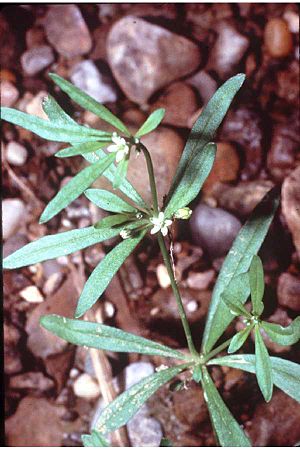Molluginaceae
| Molluginaceae | |
|---|---|

| |
| from Thomé (1885) | |
| Scientific classification | |
| Kingdom: | |
| (unranked): | |
| (unranked): | |
| (unranked): | |
| Order: | |
| Family: | Molluginaceae |
| genera | |
|
see text | |
Molluginaceae are a family of flowering plants recognized by several taxonomists. It was previously included in the larger family Aizoaceae. The APG III system of 2009 made no change in the status of the family as compared to the APG II system of 2003 and the APG system of 1998, apart from a reassignment of several genera, such as the placement of Corrigiola and Telephium into Caryophyllaceae, Corbichonia in Lophiocarpaceae, Microtea into Microteaceae and Limeum in Limeaceae, because the family was found to be widely polyphyletic in Caryophyllales. In addition Macarthuria was found not to be related to Limeum as previously thought and thus it was placed in Macarthuriaceae, and similarly species formerly placed in Hypertelis, apart from type species Hypertelis spergulacea, a true Molluginaceae, were found to belong elsewhere and were described as Kewa in the family Kewaceae, named for the Royal Botanic Gardens Kew.[2] Molluginaceae is still assigned to the order Caryophyllales in the clade core eudicots, although the generic circumscription is difficult because Mollugo is not monophyletic.
Genera
Molluginaceae in its current circumscription includes ca 9 genera and ca 80 known species[3]
- Adenogramma Rchb.
- Coelanthum E.Mey. ex Fenzl
- Glinus L.
- Glischrothamnus Pilg.
- Hypertelis E.Mey. ex Fenzl
- Mollugo L.
- Pharnaceum L.
- Polpoda C.Presl
- Psammotropha Eckl. & Zeyh.
- Suessenguthiella Friedrich
Excluded genera
- Corbichonia Scop. (now correctly placed in Lophiocarpaceae)
- Corrigiola L. (now correctly placed in Caryophyllaceae)
- Kewa Christenh. (correctly placed in Kewaceae)
- Limeum L. (now correctly placed in Limeaceae)
- Macarthuria Hugel ex Endl. (now correctly placed in Macarthuriaceae
- Orygia Forssk. = Corbichonia Scop. (Lophiocarpaceae)
- Semonvillea J.Gay = Limeum L. (Limeaceae)
- Telephium L. (now correctly placed in Caryophyllaceae)
References
- ↑ Angiosperm Phylogeny Group (2009). "An update of the Angiosperm Phylogeny Group classification for the orders and families of flowering plants: APG III" (PDF). Botanical Journal of the Linnean Society. 161 (2): 105–121. doi:10.1111/j.1095-8339.2009.00996.x. Retrieved 2013-07-06.
- ↑ Christenhusz, Maarten J.M.; Brockington, Samuel F.; Christin, Pascal-Antoine; Sage, Rowan F. (8 October 2014). "On the disintegration of Molluginaceae: a new genus and family (Kewa, Kewaceae)". Phytotaxa. 181 (4): 238–243. doi:10.11646/phytotaxa.181.4.4.
- ↑ Christenhusz, M. J. M.; Byng, J. W. (2016). "The number of known plants species in the world and its annual increase". Phytotaxa. Magnolia Press. 261 (3): 201–217. doi:10.11646/phytotaxa.261.3.1.
External links
- Molluginaceae in L. Watson and M.J. Dallwitz (1992 onwards). The families of flowering plants: descriptions, illustrations, identification, information retrieval. Version: 30 May 2006. http://delta-intkey.com
- Molluginaceae in the Flora of North America
- NCBI Taxonomy Browser
- links at CSDL
![]() Media related to [[commons:Category:{{#property:P373}}|Molluginaceae]] at Wikimedia Commons
Media related to [[commons:Category:{{#property:P373}}|Molluginaceae]] at Wikimedia Commons
![]() Data related to Molluginaceae at Wikispecies
Data related to Molluginaceae at Wikispecies
| Wikimedia Commons has media related to [[commons:Template:If then show|Template:If then show]]. |
| This Caryophyllales article is a stub. You can help Wikipedia by expanding it. |